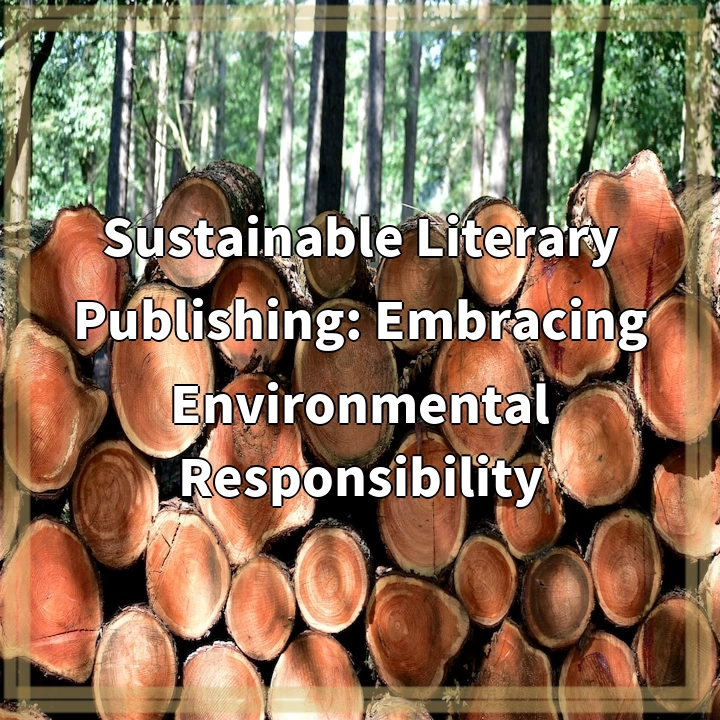
What is Sustainable Literary Publishing?
Sustainable literary publishing refers to the practice of responsibly producing and distributing books, magazines, and other forms of written literature while minimizing negative environmental impacts. It involves adopting eco-friendly practices throughout the entire publishing process, from sourcing materials to printing, packaging, and distribution.
Real-World Problems Associated with Sustainable Literary Publishing
1. Deforestation and Paper Consumption
Traditional publishing heavily relies on paper, leading to deforestation and increased carbon emissions. The demand for paper contributes to logging activities that deplete forests and harm biodiversity. Sustainable literary publishing seeks to minimize paper consumption and encourage the use of recycled and responsibly sourced paper.
2. Carbon Footprint
The publishing industry is a significant contributor to greenhouse gas emissions, primarily due to energy-intensive printing processes and transportation. Sustainable literary publishing aims to reduce carbon footprints by adopting energy-efficient technologies, utilizing renewable energy sources, and promoting local sourcing and distribution whenever possible.
3. Waste Generation
Printed books and magazines contribute to waste generation, both during production and after their use. Unsold inventory often ends up in landfills, resulting in environmental pollution. Sustainable literary publishing focuses on reducing waste by opting for print-on-demand methods, using eco-friendly inks and materials, and adopting recycling and waste management strategies.
4. Chemical Usage and Pollution
The publishing process involves the use of various chemicals, such as inks, solvents, and coatings, which can have detrimental effects on the environment and human health. Sustainable literary publishing promotes the use of non-toxic, plant-based inks, and environmentally friendly printing practices to minimize chemical usage and pollution.
5. Social and Economic Inequities
Traditional publishing often perpetuates social and economic inequities by favoring established authors and large publishing houses. Sustainable literary publishing aims to promote diversity and inclusivity by supporting independent and underrepresented voices, offering fair compensation to authors and employees, and fostering a supportive and inclusive literary community.
Conclusion
Sustainable literary publishing addresses the environmental and social challenges posed by the traditional publishing industry. By embracing eco-friendly practices, minimizing waste, and promoting inclusivity, it works towards a more responsible and equitable future for the world of literature.

Solutions for Sustainable Literary Publishing
1. Sourcing Responsible Materials
Utilize eco-friendly paper options such as recycled paper or paper sourced from sustainable forests. Choose printing companies that prioritize responsible sourcing of materials.
2. Adopting Eco-friendly Printing Practices
Use vegetable-based inks and low-VOC (volatile organic compound) solvents to minimize chemical usage and pollution. Explore energy-efficient printing technologies and equipment to reduce carbon emissions.
3. Implementing Waste Reduction Strategies
Opt for print-on-demand methods to avoid excessive inventory and waste. Utilize recycling programs and encourage customers to recycle or donate their used books. Explore innovative ways to repurpose or upcycle unsold or damaged publications.
4. Promoting Digital Publishing
Encourage the adoption of digital platforms and e-books as a sustainable alternative to printed materials. Promote the benefits of digital publishing, such as reduced paper consumption, decreased transportation emissions, and accessibility for a wider audience.
5. Fostering Inclusivity and Fair Practices
Support independent authors, diverse voices, and smaller publishing houses. Offer fair compensation and inclusive opportunities for authors and employees. Actively work towards breaking down barriers and promoting diversity within the publishing industry.
Conclusion
By implementing these solutions, sustainable literary publishing can minimize environmental impacts, reduce waste, and promote a more inclusive and equitable industry. Embracing these practices not only benefits the environment but also supports the creation of a vibrant and diverse literary community.















